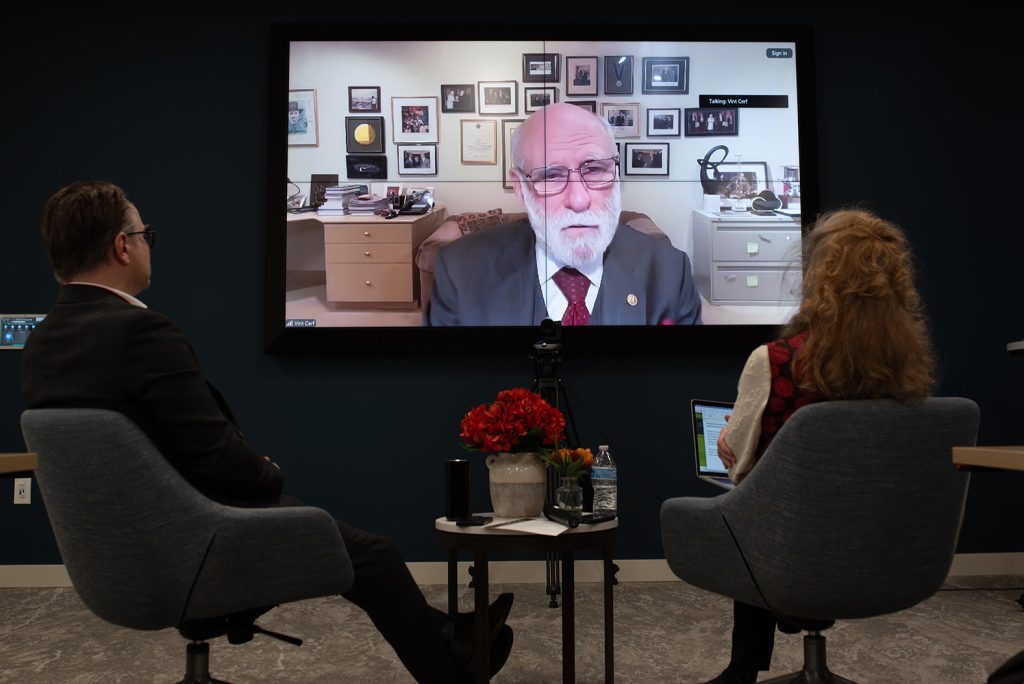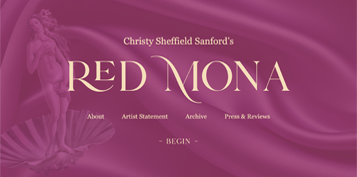The Future of Text in XR Symposium

On Saturday, November 23, 2024, Electronic Literature Lab’s Dene Grigar co-hosts (with Frode Hegland) The Future of Text in XR Symposium. The event, which takes place at The Murdock located at the Vancouver Waterfront, 655 W. Columbia Way, Suite 700, is associated with The Future of Text in XR project, and funded by the Alfred P. […]
Dene Grigar Received ELO’s Luesebrink Award
The Electronic Literature Lab’s founder and Director Dene Grigar, was given The Marjorie C. Luesebrink Career Achievement Award by the International arts organization, Electronic Literature Organization (ELO). This award honors “a visionary artist and/or scholar who has brought excellence to the field of electronic literature and has inspired others to help create and build the field” (“ELO […]
Reconstructing & Restoring Christy Sheffield Sanford’s Red Mona

The lab finished the work to reconstruct Christy Sheffield Sanford’s work of net art, Red Mona, and restore the original website that presented it. This activity marks the first time we have done both activities to a single work of digital art to preserve it. Red Mona is a narrative based on Guy de Maupassant’s short […]
Restoring Sanford’s “Red Mona”
The Electronic Literature Lab is restoring Christy Sheffield Sanford’s “Red Mona,” a work of net art that unfolds over the course of 42 “flash-cards” containing text, images, and sound. Based on Guy de Maupassant’s story, Petit Soldat, it was exhibited in 1997 at the “Maid in Cyberspace XX” exhibition held in Montreal. Much information can be […]
James Lesperance Selected for a WSU Vancouver Undergraduate Research Fellows Award
Lesperance’s project, “Programming a Method for Documenting NetProv” funded by the award, will result in a custom data visualization for Rob Wittig’s seminal NetProv Grace, Wit, & Charm (2011) that will serve as a proof-of-concept for documenting many other NetProv works by the author and others involved in the art form. Grace, Wit, & Charm […]
Book Launch for The Challenges of Born-Digital Fiction
Join us for the launch of Dene Grigar and Mariusz Pisarski’s The Challenges of Born-Digital Fiction: Editions, Translations, and Emulations on March 22, 2024 at 8 a.m. PDT via Zoom. Particpants include editor Gabriel Hankins and artists Michael Joyce, Judy Malloy, and Stuart Moulthrop. Published by Cambridge University Press in its Element Series, the book addresses […]
Experiments with the Quest 3 and Apple Vision Pro
“The Future of Text in XR” project is underway, just a month after our kick off, with the arrival of our headsets. While our project is not limited to one specific VR product, we are interested in the Apple Vision Pro as a harbinger of what is to come with the other headsets in an […]
Happy 40th Birthday, Macintosh!
by Dene Grigar, Director, Electronic Literature Lab What? An exhibition of Apple products from 1984-present in celebration of Macintosh’s 40th anniversary Where? Washington State University Vancouver, second floor of the VMMC next to room 211A Who? The Electronic Literature Lab More info? Contact Dene Grigar, dgrigar@wsu.edu On January 24, 1984 the Apple Corporation released the […]
The Future of Text in XR

Frode Hegland & I learned last week that our project, “The Future of Text in XR,” was funded by the Alfred P. Sloan Foundation. Here is the link to the Future of Text website with detailed information about our work, including videos and prototypes. Abstract We believe a fundamental change will occur when […]
Memorial for Marjorie C. Luesebrink
On November 14, the lab led the Memorial event in honor of pioneering electronic literature artist, Marjorie C. Luesebrink, or “Margie,” who wrote under the pen name M. D. Coverley. The event took place at the Tuesday Salon, hosted by Deena Larsen on behalf of the Electronic Literature Organization (ELO). Sixty-seven people from all over […]
